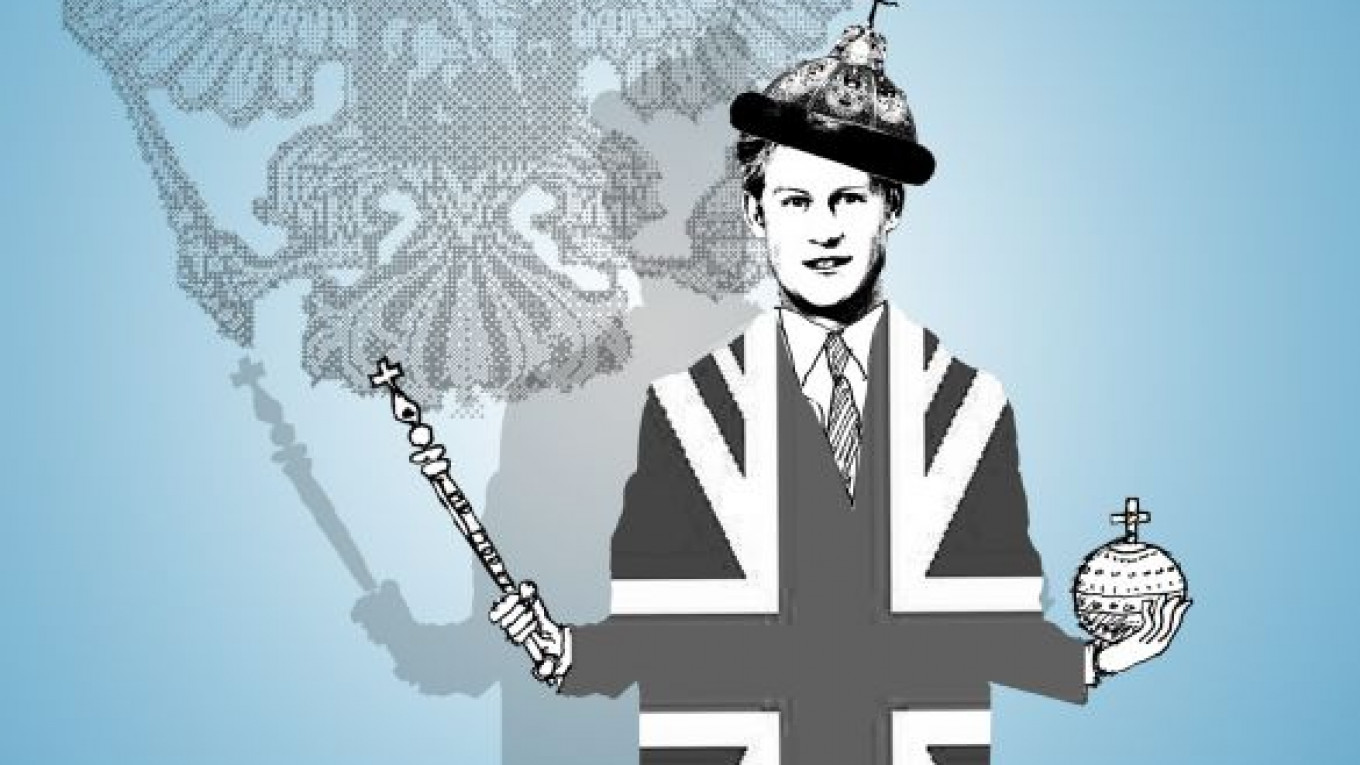This week, a former diplomat-turned-blogger unveiled his vision of how to save Russia: borrowing Prince Harry from Britain and crowning him tsar to rule over us. It was certainly more interesting than the endless ponderings on the future of the ruling tandem, and the British tabloid Daily Mail was rather keen on the idea.
Former diplomat Alexander Baunov has written some fairly undiplomatic pieces in his new role as an editor and blogger on Slon.ru. Last year he wrote a very funny article about St. Petersburg governor Valentina Matviyenko and her energetic management as a Russian ambassador in Athens, where she built a swimming pool and a tennis court and banned diplomats from taking their usual lunchtime snoozes that stretched until the end of the working day.
This week, as the world speculated over whether Prince Harry had been admiring the chief bridesmaid’s bottom, Baunov had more lofty thoughts and wrote a manifesto calling for Prince Harry to be crowned tsar of Russia. He also proposed that the prince should change his name to Igor — a fairly drastic measure, but then again, he might not like his Russian-accented moniker of “Prints Garry.”
Russia is short on royalist pageantry, Baunov complained, forcing viewers to accept a second-best elite of “flabby state deputies, singers who can’t sing and ‘graduates’ of the reality show ‘Dom-2.’”
Those slurs on showbiz royalty might not go down too well with Russia’s semi-official “king of pop”, Filipp Kirkorov, who takes his honorific title rather seriously. This week, he celebrated his 44th birthday with a giant cake reading “Happy Birthday, the King Philip” in broken English and a jewel-studded crown perched on his black curls. Unlike many royal receptions, though, the concert ended with a fight between security guards and audience members, Life News said.
Baunov’s idea proved surprisingly popular with an accompanying survey finding that almost 40 percent backed a constitutional monarchy in Russia. In Britain, the devotedly royal-watching tabloid Daily Mail gave it a big spread. It even found some Russian women swooning about Harry’s allure on the Internet. “Many girls in Russia would like to caress his ginger locks,” it quoted one woman, named Anna, as saying.
The royal wedding was all very well in its way, but sadly it could not hold a candle to the lavish nuptials of Russian ballerina Anastasia Volochkova — even if the couple later separated and her husband was reportedly lured away by the charms of a yoga instructor.
With her usual frankness, Volochkova called a spade a spade and said her wedding in 2007 to businessman Igor Vdovin — which included three different dresses and the bride landing in a hot-air balloon — was altogether a classier affair.
“The wedding cost 36 million [pounds] but I do not see any particular luxury,” she sniffed on Twitter, after watching live on a television talk show. “My wedding was less expensive but more refined, chic, interesting and unpredictable. I flew in on a hot-air balloon,” she boasted.
She was backed up by Newsweek's Anna Nemtsova, who on Ekho Moskvy lamented the lack of spectacular weddings in Russia, saying she and her friends could only remember one: Volochkova’s.
On the day of the royal wedding, Volochkova also took part in filming Channel One’s compulsively watchable dating show “Let’s Get Married,” although she wrote on Twitter that she did not pick any of the potential husbands she was offered, describing them as “dodgy.”
Rather extraordinarily, she admitted on the show that despite the pomp and ceremony, she had never actually officially registered her marriage to Vdovin, Komsomolskaya Pravda reported.
An earlier version of this article incorrectly stated that Anna Nemtsova works for Russian Newsweek. Russian Newsweek is defunct. She is a correspondent for Newsweek.
A Message from The Moscow Times:
Dear readers,
We are facing unprecedented challenges. Russia's Prosecutor General's Office has designated The Moscow Times as an "undesirable" organization, criminalizing our work and putting our staff at risk of prosecution. This follows our earlier unjust labeling as a "foreign agent."
These actions are direct attempts to silence independent journalism in Russia. The authorities claim our work "discredits the decisions of the Russian leadership." We see things differently: we strive to provide accurate, unbiased reporting on Russia.
We, the journalists of The Moscow Times, refuse to be silenced. But to continue our work, we need your help.
Your support, no matter how small, makes a world of difference. If you can, please support us monthly starting from just $2. It's quick to set up, and every contribution makes a significant impact.
By supporting The Moscow Times, you're defending open, independent journalism in the face of repression. Thank you for standing with us.
Remind me later.






